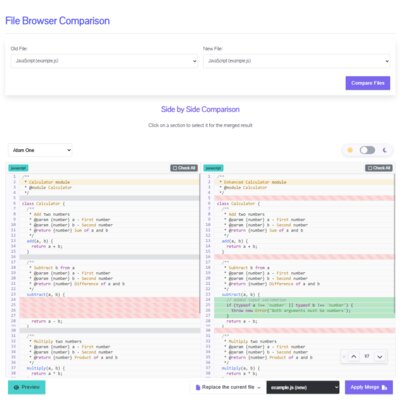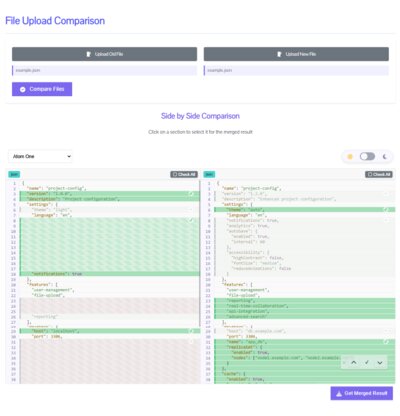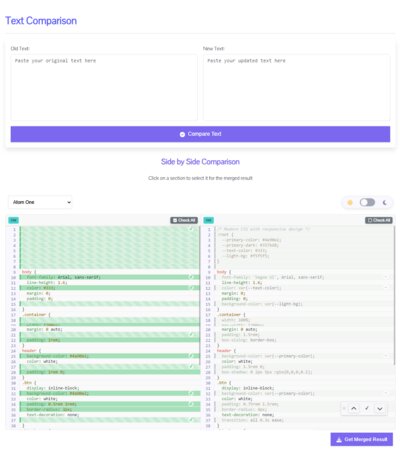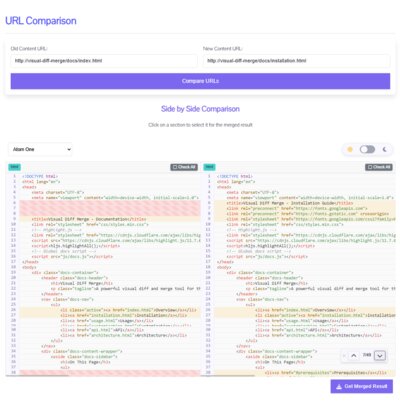Introduction
Visual Diff Merge is a powerful web-based tool for comparing and merging text files and content. It provides a user-friendly interface for visualizing differences between versions of code, text files, or content from URLs, and offers intuitive merge capabilities.
Advanced Diff Visualization
Clearly see additions, deletions, and modifications with synchronized scrolling and intelligent chunk navigation.
Multiple Content Sources
Compare content from files, direct text input, or URLs with a consistent interface.
Interactive Merge
Resolve conflicts and merge changes with an intuitive user interface.
Syntax Highlighting
Automatic language detection and syntax highlighting for over 180 programming languages.
Screenshots
Here are some screenshots of Visual Diff Merge in action:
Click on any screenshot to view it in fullscreen mode.
Key Features
-
Multiple Operation Modes
Support for four distinct modes: File Browser (server files), File Upload (local files), Text Compare (direct input), and URL Compare (web content).
-
Intelligent Diff Algorithm
Accurate difference detection with configurable context lines, whitespace handling, and case sensitivity options.
-
Real-time Syntax Highlighting
Automatic language detection and syntax highlighting powered by highlight.js with support for light and dark themes.
-
Chunk-based Navigation
Easily navigate between changes with next/previous buttons and visual indicators.
-
Interactive Merge Tools
Resolve conflicts by selecting chunks from either side or custom edits.
-
Multiple Save Options
Save merged content to original files or as new files with various options.
-
Responsive Design
Works on desktop and tablets with adaptive layout for different screen sizes.
-
Customizable UI
Extensive styling options and theme customization capabilities.
-
Multilingual Support
Built-in translations with easy extension to additional languages.
Quick Start
Option 1: Quick Setup with Pre-compiled Files
For a quick setup without needing to compile anything:
git clone https://github.com/migliori/visual-diff-merge.git
# Navigate to the project directory
cd visual-diff-merge
# Install PHP dependencies only
composer install --no-dev
All pre-compiled JavaScript and CSS files are already included in the dist/ directory,
so you can start using the tool right away.
Option 2: Development Setup
If you want to modify the source code:
git clone https://github.com/migliori/visual-diff-merge.git
# Navigate to the project directory
cd visual-diff-merge
# Install all dependencies
composer install
npm install
# Compile assets for development
npm run compile-scssFor detailed setup instructions, refer to the Installation Guide.
After installation, you can use Visual Diff Merge in one of the four operation modes:
For a complete setup guide, see the Installation page.
Configuration
Visual Diff Merge is highly configurable through the api/config.php file.
You can customize:
- Diff generation settings (context lines, whitespace handling, etc.)
- UI appearance and themes
- Default language and translations
- Security settings and allowed directories
- Debug settings and logging
For detailed configuration options, see the Customization page.
Getting Help
Visual Diff Merge is open-source software. If you need help or want to contribute:
- GitHub Repository: https://github.com/migliori/visual-diff-merge
- Issue Tracker: Report bugs or request features
- Documentation: This documentation is your comprehensive guide to Visual Diff Merge
Documentation Overview
Installation
How to install and set up Visual Diff Merge
- Prerequisites
- Installation steps
- Server configuration
- Troubleshooting
Usage
How to use Visual Diff Merge in different modes
- File browser mode
- File upload mode
- Text compare mode
- URL compare mode
Customization
How to customize Visual Diff Merge
- Configuration settings
- Styling
- Translations
- Extensions
API
API reference and integration
- Endpoint documentation
- Request/response formats
- Security considerations
- Integration diff-viewer
Architecture
Technical architecture and design
- System components
- Data flow
- Initialization sequence
- Extension points



